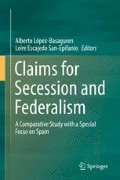Abstract
The Central State should provide an answer to the demands of the majority of Catalan citizens. This answer should contain more self-government. But it will be not enough to reform only the Statute of Autonomy within the current established parameters; the Constitution should also recognize the Catalan singularity. Ways must be found to implement the principle: “Enough for Catalonia, acceptable for the rest”.
Such a reform is only reasonable within a constitutional reform which recognizes and defines the territorial organization of power in a federal sense. Federalism and asymmetry have not always been a good combination. However, only within a federal framework would the recognition of the Catalan singularity be feasible. This framework could also become the meeting point between the majority of Catalans and the rest of Spanish citizens. It should also be clear that the recognition of singularity is already part of our constitutional order and present in the Constitution of 1978. On the one hand, because of the recognition of the difference between nationalities and regions and on the other, related to the integration of the historic rights of the Basque Country and Navarra.
There would be an important additional advantage of a constitutional reform: this reform would require the vote of the Catalan people. The citizens of Catalonia would have to endorse the reformed model. And twice. On the one hand, in the referendum on the Constitution itself. Furthermore, in the necessary referendum on the Catalan Constitution or Statute which would be adopted within the new legal framework. The constitutional referendum would also have the advantage that all Spaniards would participate. In this way, the principles of legality and democracy would be respected.
The construction of an alternative is the first answer to the desire for independence. But the arguments which contradict the desire for independence should not be forgotten. The first is the absence of a majority for this demand among the people of Catalonia. The support for independence does not reach the limit of 50% plus one. In any case, it should be clear that such a traumatic process requires a sufficient majority which, at least, should not be less than the majority required for a reform of the Statute of Autonomy. Today, as stated by Le Monde, “it is far from being morally sufficient in order to justify a break with Spain”.
Access this chapter
Tax calculation will be finalised at checkout
Purchases are for personal use only
References
Aguirreazkuenaga I (2006) Las pretensiones de los nacionalismos periféricos. El caso vasco en BERNARDO. In: de Bernardo Ares JM, Muñoz Machado S (eds) El Estado-Nación en dos encrucijadas históricas. Iustel, Madrid
Aja E (2014) Estado autonómico y reforma federal. Alianza, Madrid
Ariño G (2015) La independencia de Cataluña. Historia, Economía, Política, Derecho. Thomson Reuters-Aranzadi, Pamplona
Blanco Valdés R (2012) Los rostros del federalismo. Alianza, Madrid
Blanco Valdés R (2014) El laberinto territorial español. Alianza, Madrid
Camaño F (2014) Democracia federal. Apuntes sobre España. Ediciones Turpial, Madrid
Cano Bueso J (2017) Cataluña en su laberinto. Tirant, Valencia
Fossasespadaler E (1999) Asimetría y plurinacionalidad en el Estado autonómicoen. In: Fossasespadaler E, y Requejo F (eds) Asimetría federal y Estado Asimetría federal y Estado plurinacional. Madrid, Trotta
García Pelayo M (1984) Derecho constitucional comparado. Alianza, Madrid
Garrido López C (2017) Pero… ¿Puede ser el Senado una Cámara de representación territorial? REDC 107:75–116
López Basaguren A (2012) Reforma del Estado autonómico e integración de los nacionalismos: un reto. www.fundacionmgimenezabad.es
López Basaguren A (2013a) Escocia y el referéndum por la independencia: algunas enseñanzas. Cuadernos de Alzate 46–47:127–140
López Basaguren A (2013b) Los referendos de secesión de Quebec y la doctrina de la Corte Suprema de Canadá en La participación política a debate. Referendums y consultas populares. In: Contreras M, Saénz E (eds) Comuniter, Zaragoza
López Garrido D (1994) Hacia un nuevo Senado. Propuesta de reforma constitucional. Revista de las Cortes Generales 33:7–25
López-Basaguren A, Escajedo L (2013) The ways of federalism in western countries and the horizons of the territorial autonomy in Spain. Springer, Londres
Muñoz Machado S (2014) Cataluña y las demás Españas. Crítica, Barcelona
Rubio Llorente F (2008) La reforma de la Constitución: sobre la posibilidad, conveniencia y dificultad de llevarla a cabo. Claves de Razón Práctica n° 188
Ruiz Soroa JM (2013) Regular la secesión. Cuadernos de Alzate 46–47:186–204
Solozabal Echavarría JJ (2014a) El problema catalán en la crisis del Estado autonómico. Revista de Libros, Mayo
Solozabal Echavarría JJ (2014b) La reforma federal y sus siete espejos. Biblioteca Nueva, Madrid
Tornos Mas J (2014) El problema catalán. El Cronista del Estado Social y Democrático de Derecho n° 42:44–53
Tornos Mas J (2015) De Escocia a Cataluña. Referéndum y reforma constitucional. Iustel, Madrid
Tudela Aranda J (2009) El Estado desconcertado y la necesidad federal. Cívitas
Tudela Aranda J (2011) ¿Reforma constitucional en clave federal? Sistematización de problemas generados por las reformas y posibles soluciones. REP 151:231–279
Tudela Aranda J (2016) El fracasado éxito del Estado autonómico. Una historia española. Marcial Pons, Madrid
Virgala E (2008) El Informe del Consejo de Estado de 2006 sobre modificaciones de la Constitución española. REDC 82:211–260
Watts R (2006) Sistemas federales comparados. Marcial Pons, Madrid
Wheare KC (1963) Federal Government. Oxford University Press, Oxford
Author information
Authors and Affiliations
Corresponding author
Editor information
Editors and Affiliations
Rights and permissions
Copyright information
© 2019 Springer Nature Switzerland AG
About this chapter
Cite this chapter
Tudela Aranda, J. (2019). The Constitutional Answer to the Crisis of the Model of Territorial Organization. In: López-Basaguren, A., Escajedo San-Epifanio, L. (eds) Claims for Secession and Federalism. Springer, Cham. https://doi.org/10.1007/978-3-319-59707-2_29
Download citation
DOI: https://doi.org/10.1007/978-3-319-59707-2_29
Published:
Publisher Name: Springer, Cham
Print ISBN: 978-3-319-59706-5
Online ISBN: 978-3-319-59707-2
eBook Packages: Law and CriminologyLaw and Criminology (R0)

